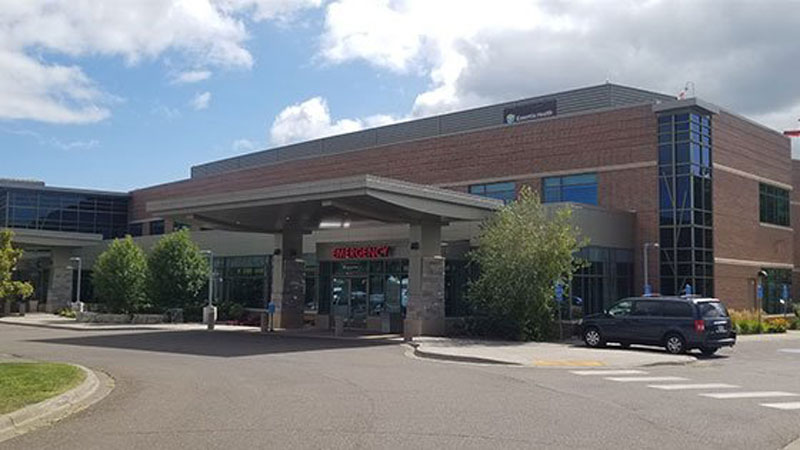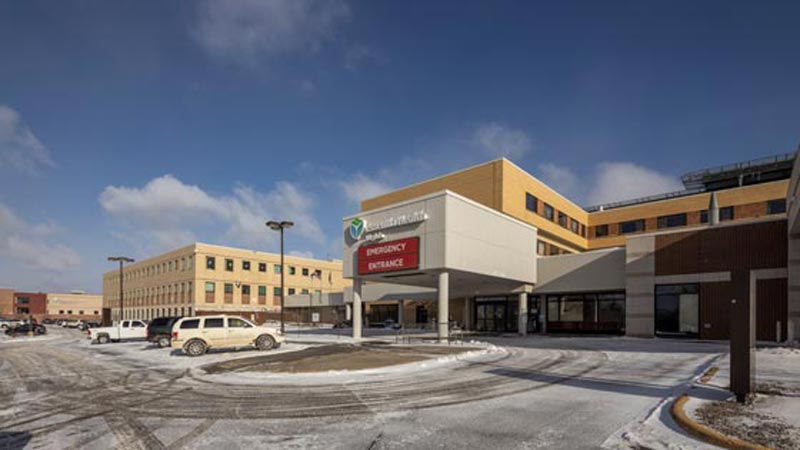Emergency Department
Content medically reviewed by: Christopher Anderson, MD; Toby Jezzard, Director of Emergency Services
Choose an Essentia Health emergency department near you in Minnesota, North Dakota, or Wisconsin for fast, compassionate medical care.
Overview
The Emergency Department provides medical evaluation and treatment to presenting patients of various ages with varying levels of illness and injury from minor to critical. Services include medical screening evaluations, patient triage, medical procedures and testing as it pertains to the services rendered.
Objectives of the Emergency Department are to provide a clinical environment conducive to medical screening evaluation and identification of emergency medical conditions, prioritization (triage) for treatment, appropriate medical interventions and evaluation of response to treatment.
Find a Location Near You


Emergency Department Team
Count on Essentia's multidisciplinary team to evaluate and treat your condition as quickly as possible and provide support to your family. Your team may include:
- Emergency medicine doctors, physicians assistants, nurse practitioners, and nurses
- Surgeons, such as trauma surgeons, orthopedic surgeons, and neurosurgeons
- Specialists, such as cardiologists, pulmonologists, and radiologists
- Social workers*
- Behavioral and mental health providers
- Spiritual care providers
*Not available at all Essentia Health ER locations.
Toxicology Services
If you or a loved one come into contact with a toxic substance or have symptoms of an overdose, get care as quickly as possible. Several Essentia Health emergency departments in northeastern Minnesota offer toxicology services. Your doctor may consult with a toxicologist, or Poison Control, who has advanced training to diagnose and treat conditions caused by exposure to chemicals, poisons, drugs, and other substances. If you have further questions, please call Poison Control at 1-800-222-1222.
Hospital Visitor Guideline
Essentia Health recognizes that family involvement is an essential component of total patient care and encourages visits of family and friends. However, since many patients, particularly those in the specialty units, are highly susceptible to certain communicable disease, and because their exposure to such disease may have serious consequences, visitation guidelines are to be followed. To learn more about our current visitor guidelines, visit our Hospital & Clinic Visitor Guidelines.
What to Expect at the Emergency Department
When you arrive, a nurse will check your blood pressure, pulse, and temperature, and ask questions about the reason for your visit. You also may be asked about your health history, medications, or drug allergies.
Most patients are seen in the order they arrive, but those with life-threatening issues must be seen first. If you don't need immediate care, you’ll stay in the waiting room until an exam room is ready.
Tell a staff member if your condition gets worse. Don’t leave without being seen. If you decide to leave without treatment, talk to a staff person first.
-
Your Exam at the ERYou’ll be taken to an exam room where a nurse will assess your condition and ask questions about your injury or illness. A paramedic or patient care technician may help. Then, an emergency department doctor or advanced practitioner will finish your exam.
You may be asked the same questions by different members of your care team. This is done for your safety and to make sure you get the best care. You can rely on your care team to listen to you and communicate with each other. -
Tests at the ER
Depending on your condition, your doctor may order blood tests, imaging services, etcetera. Your doctor may also consult with other specialists. Trust us to do our best to identify the cause of your health concern.
-
Care &Treatment
Once we diagnose your condition, your care team will develop a treatment plan. You may get treatment in the emergency room and go home, or you may be admitted to the hospital. Before going home, you’ll receive discharge instructions, which may include information about medications. You may need to get follow-up care from a primary care doctor or a specialist.
How You Can Help
To help your visit to the emergency department go as smoothly as possible we recommend you:
- Bring your photo ID and insurance card
- Wait to eat or drink until your care team says it’s OK
- Know the name of your primary care doctor
- Know the names and doses of any medications you take
- Limit your cell phone use while staff cares for you
- Cover your mouth when you cough or sneeze
- Wash your hands and use hand sanitizer
- Check with staff before you use the restroom
- Ask questions and take notes
- Keep your mask on at all times if masking is required
Give Your Feedback
Within a few weeks of your visit, you may get an email asking about your experience. We welcome the opportunity to hear your feedback. You can also let us know about your experience by sending an email to our patient relations department.
Your Privacy, Safety, & Comfort
Expect your care team at Essentia to ensure your privacy and well-being by:
- Verifying your name and date of birth each time we interact with you
- Closing your room’s door or curtain
- Keeping your bed’s side rails up and call lights in reach
- Practicing good hand hygiene
- Answering your questions and listening to concerns about privacy
Specialty Intensive Care Units (ICUs)
You may benefit from getting care at an ICU that offers specialty care to treat certain conditions. Learn more about critical care services at Essentia.
Service Offered
-
Emergency Medicine
When you need emergency care, visit an Essentia Health emergency room near you in Minnesota, Wisconsin, or North Dakota.